 |

|
|
 |
Special
Report on Selected Side Events at UNFCCC COP-6
published by the International Institute for Sustainable Development
(IISD)
in co-operation with the UNFCCC Secretariat
|
 |
|
|
Events convened on Thursday 23
November 2000
|
|
A focus on equity
presented by the Centre for Science and Environment (CSE), the
World Council of Churches (WCC) and the Heinrich Böll Foundation (HBF)
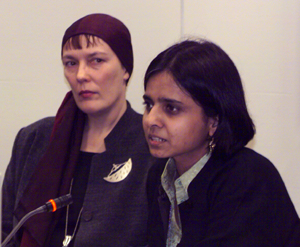 |
| Sunita Narain, CSE, calls for equal shares for all in the atmospheric commons. H.E.
Satu Hassi, Minister of Environment and Development Cooperation, Finland, prepares to respond. |
Sunita Narain, Co-director of India's Centre for Science and Environment (CSE), told participants at this event, which focused on equity, that the Kyoto Protocol is inherently flawed. She attributed this analysis to the fact that the Protocol process is exclusively based on economic values, to the exclusion of ecological and social equity.
Narain claimed that the CSE's proposed alternative to the current climate change framework, which is based on a global allocation of equal per capita emission entitlements, is the only way to ensure an equitable role for developing countries in the global commons. H.E. Satu Hassi, Minister of Environment and Development Cooperation, Finland, supported the CSE approach, but reminded listeners that no such global decision-making framework exists at present and she described the Kyoto Protocol as "a step in the right direction."
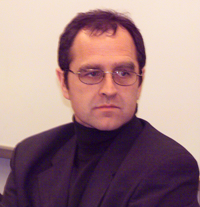 |
| Reinhard Loske, Green Party parliamentarian, advocates decoupling economic growth and carbon intensive development. |
Reinhard Loske, a Green Party parliamentarian from Germany, using his country as an example, remarked that economic growth and increases in CO2 emissions can be decoupled. On the use of flexibility mechanisms, he maintained that the Clean Development Mechanism could become a source of valuable funding for developing countries in the wake of dwindling levels of Official Development Assistance (ODA). David Hallman, World Council of Churches, supported the CSE's criticism of the Protocol and argued that the action required to generate alternative approaches is constrained by the complacency brought about by affluence. Jörg Haas, HBF, noted that principles of equity should be included in the text negotiated at COP-6 to provide a firm basis for the second commitment period.
Discussion: Participants exchanged views on: the need to embed a principled approach to equity in the COP-6 draft text on mechanisms; flaws in the Protocol's baseline approach; the need for a global cap on GHG emissions; the need to develop new technology; decoupling carbon intensity and development; and the adoption of the contraction and convergence model for the medium term. One participant pointed out that the equity principle alone would not be sufficient to alleviate poverty in countries with small per capita emissions.
More information:
http://www.cseindia.org
<cse@cseindia.org>
Contacts:
Reinhard Loske <reinhard.loske@bundestag.de>
Jörg Haas <haas@boell.de>
Sunita Narain <sunita@cseindia.org>
David Hallman <dhallman@uccan.org>
|
|
The Clean Development Mechanism (CDM) and nuclear power
presented by the International Atomic Energy Agency (IAEA)
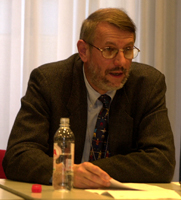 |
| Hans-Holger Rogner, IAEA, addresses concerns about nuclear technology and its possible role in the CDM . |
The International Atomic Energy Agency's (IAEA) Hans-Holger Rogner introduced speakers from India, the Republic of Korea, China, Vietnam and Pakistan, to discuss potential support for the development of nuclear energy capacity using the CDM. He explained that the presentations, which have been collated in the IAEA publication Nuclear Power for Greenhouse Gas Mitigation, followed a request by the FCCC Parties.
Rogner proceeded to address concerns behind proposals to exclude nuclear technology from the CDM. On concerns about the technology, including waste disposal, he suggested that the FCCC was not the place for such a discussion and that reactors that do not meet modern safety standards are either being upgraded or shut down.
R.B. Grover, presenting the case study from India, outlined plans to expand electricity provision through 2012, including an increase in nuclear capacity from 1,840 MW in 1997 to 7,600 MW in 2012. He outlined the additionality case for nuclear power, stating that some nuclear power plants would not proceed in the absence of the CDM, due to a lack of competitiveness.
Chaeyung Lim, the Republic of Korea, said that the cost of carbon reduction for nuclear power is 6.33 $/tC, comparing it with 65$/tC for a gas-fired combined cycle plant. He added that nuclear power would also improve energy security. Liu Deshun, China, outlined China's plans to increase its nuclear power capacity from 0.4% today to 5% in 2020. He described how nuclear power could meet the CDM's additionality test because the construction of nuclear plants in an increasingly liberalized energy market would not be competitive without a subsidy. Le Doan Phac, Vietnam, outlined a number of potential CDM options including the construction of a CANDU-6 nuclear power plant, which offers the lowest cost GHG mitigation potential at $33.38 per ton of carbon equivalent. Muhammad Latif, Pakistan, described plans to reduce GHG emissions using cleaner technologies, including nuclear power. He argued that nuclear power satisfies financial additionality for the CDM, given that, in the absence of the CDM, coal-fired plants would be constructed instead.
More information:
International Atomic Energy Agency: http://www.iaea.org
Contacts:
IAEA: <official.mail@iaea.org>
|
|
Climate change:
an update on recent research from the United Kingdom's Hadley Centre
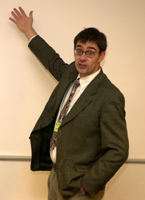 |
| Peter Cox, Hadley
Centre for Climate Prediction and Research. |
Geoff Jenkins and Peter Cox, from the UK's Hadley Centre for Climate Prediction and Research, delivered an update on the Centre's latest investigations. They discussed patterns and trends in climate change, modeling the carbon cycle, and the variable effects of using forests as carbon sinks.
Jenkins outlined predictions of future climate change that may result from the recent set of emissions scenarios produced for the Intergovernmental Panel on Climate Change (IPCC) in the Special Report on Emissions Scenarios (SRES). The Hadley Centre coupled ocean-atmosphere model (HadCM3) predicts changes that vary with location and in time. Based on the IPCC scenarios of future emissions, the Hadley Centre predicts a global warming over the next 100 years of between 2°C and 4°C. Warming over land is expected to be some 80% faster than over sea; the highest IPCC emission scenario would lead to an almost 6°C rise over land by 2100.
Cox delivered a presentation on the acceleration of global warming due to carbon cycle feedback. He described how climate change will disrupt the natural cycle of carbon dioxide between atmosphere, ocean and land. He said the Centre had included this feedback in a climate model for the first time, and found that CO2 in the atmosphere rises much faster, leading to approximately 40% greater warming.
On sinks, Cox discussed an observation that in some parts of the world, climate change may lead to less rapid tree growth, or even die back, and hence less uptake of CO2 than once envisaged. He also pointed out that because trees are usually darker than the underlying surface, they will absorb more sunlight than areas with no trees and hence act to warm the planet. Therefore the beneficial effects on climate of their carbon uptake could be reduced, and in some cases reversed, by their darkening effect.
More information:
The Meteorological Office (UK): http://www.metoffice.gov.uk
The latest Hadley Centre research is available at: http://www.metoffice.gov.uk/research/hadleycentre/pubs/brochures/B2000/index.html
Contacts:
Geoff Jenkins <gjjenkins@meto.gov.uk>
Peter Cox: <pmcox@meto.gov.uk>
E-mail: <hadley@meto.gov.uk>
|
|
Towards co-ordinated climate protection strategies
presented by the Wuppertal Institute for Climate, Environment and Energy and the Institute for Global Environmental Strategies
(IGES)
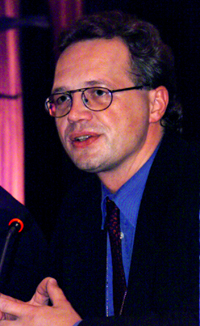 |
| Hermann Ott, Wuppertal Institute, elaborates on the role of the information technology industry in the climate change dialogue. |
At this event, convened by the Wuppertal Institute for Climate, Environment and Energy, Germany, and the Institute for Global Environmental Strategies (IGES), Japan, results were presented from a joint workshop on "International Climate Policy and the Information Technology Sector."
Hermann Ott, Wuppertal Institute, presented findings from a survey of Japanese and German businesspeople. While German respondents tended to oppose the use of nuclear energy, the survey showed that many Japanese people regard it as a necessary evil. He also found optimism among both sets of respondents regarding the potential for voluntary CO2 emissions reductions, correlated with an expectation that new business opportunities would result.
Thomas Langrock, Wuppertal Institute, reported on a study of internet growth patterns and energy impacts. His wide-ranging conclusions addressed the role of environmental concerns in consumer behavior, factors in effective policy-making and regulation, and the information needs of businesses. Shuzo Katsumoto, IGES, then outlined findings on the growing market for mobile internet devices in Japan and the impact of mobile computing on energy usage.
Silvio Weeren, IBM Deutschland, and Masayuki Sasanouchi, Toyota Motors, presented on energy factors in their respective industries. Weeren detailed IBM's strong environmental track record, and Sasanouchi described vehicular emissions-related improvements, including "intelligent transport systems" that help drivers to avoid traffic congestion and benefit from the energy efficiency gains.
Kazuo Matsushita, IGES, addressed ways in which the "IT revolution" will change popular lifestyles, and identified these as areas for future study.
Discussion: Discussion addressed: the potential for improvements in the energy efficiency of IT products in the absence of the Kyoto Protocol, and changes in household energy consumption patterns.
More information:
http://www.wupperinst.org
http://www.iges.or.jp
Contacts:
Hermann E. Ott <hermann.ott@wupperinst.org>
Thomas Langrock <thomas.langrock@wupperinst.org>
Kazuo Matsushita <k.matsushita@iges.or.jp>
Silvio Weeren <silvio.weeren@dc.ibm.com>
Paul E. Metz <e5@theoffice.net>
|
|
World Energy Outlook - 2000:
Energy, economic and environmental assessment
presented by the International Energy Agency (IEA) and the Organisation for Economic Cooperation and Development (OECD)
Jonathan Pershing, IEA, presented the World Energy Outlook (WEO) 2000. Fatih Birol, IEA, noted that for the first time the study takes into account the likely impacts of policies and measures implemented in response to the Kyoto Protocol. Previous studies were based on business-as-usual projections.
The new projections underscore some fundamental changes in energy use, with most of these expected to take place in developing countries. The study's reference case predicts 2% annual growth in world energy use and in CO2 emissions until the year 2020. Coal is expected to remain the dominant fuel used for energy generation in China and India. In OECD countries, coal will be largely replaced by natural gas. The IEA expects that one third of the nuclear plants in OECD countries will be decommissioned after 2010.
The study also contains a number of "alternative cases." In this section of the study, Fridtjof Unander, IEA, outlines several policy options to reduce CO2 emissions in the transportation sector. He notes promising developments in fuel-efficient technologies. On power generation, he concludes that an increase in the number of gas-fired combined cycle and cogeneration projects are expected to provide alternative approaches to the reduction of CO2. The study also notes that significant reductions in GHG emissions could be achieved if nuclear plants were to remain open.
Richard Baron, IEA, notes that with emissions trading, North America can realise savings of up to 62% and Europe up to 29% on emissions abatement costs. Jan Corfee Morlot, OECD, explained that measures to abate non-CO2 GHGs could significantly reduce the costs of meeting the Kyoto targets.
Discussions: Participants discussed: the use and accuracy of climate models, policies for the mitigation of GHG emissions, and the need to include non-CO2 gases in the design of effective climate change mitigation policies.
More information:
IEA <http://www.iea.org>
OECD <http://www.oecd.org/env/cc/>
Contacts:
Fatih Birol <Fatih.Birol@iea.org>
Jan Corfee Morlot <jan.corfee-morlot@oecd.org>
|
|
Climate Change and Development: a book launch
presented by the United Nations Development Programme (UNDP) Regional Bureau for Latin America and the Caribbean (RBLAC) and Yale University School of Forestry and Environmental Studies
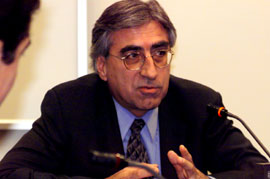 |
| Luis Gómez-Echeverri, argued that unless we link climate change to our daily lives and economic activities, it will be difficult to advance the implementation of policies. |
Environment Ministers from Bolivia, El Salvador and the Dominican Republic joined a number of other prominent participants at COP-6 for the launch of Climate Change and Development (2000), an edited collection compiled by Luis Gómez-Echeverri. Published by the UNDP in collaboration with Yale School of Forestry and Environmental Studies, the book contains a comprehensive and authoritative set of responses to the question: "Are the necessary conditions in place for developing countries to address the challenges of climate change?" Chapters written by leaders of Latin America and the Caribbean comment on poverty and the lack of institutional capacities in developing countries, focusing on health, forests, technology transfer, and capacity building.
More information:
Yale School of Forestry and Environmental Studies: http://www.yale.edu/environment
UNDP Regional Bureau for Latin America and the Caribbean: http://www.undp.org/rblac
Contact:
Michael Gucovsky <mgucovsky@hotmail.com>
Luis Gomez-Echeverri <luis.gomez.echeverri@undp.org>
Thanksgiving with the U.S. students climate summit
presented by Greenpeace International
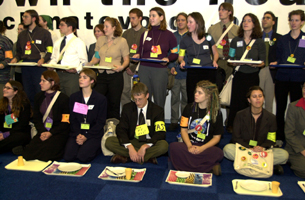 |
| Greenpeace supporters, during their fast at COP-6 |
Approximately 150 student activists from the US, attending COP-6 as guests of Greenpeace, listened to presentations about participation in international environmental policy development by a number of speakers, including John Passacantando, Executive Director, Greenpeace USA, and the television personality, Bill Nye, who specializes in science programmes. The students celebrated Thanksgiving by participating in a fast to protest the slow pace of the COP-6 negotiations.
|
|
|









